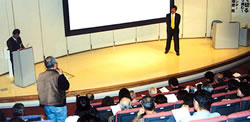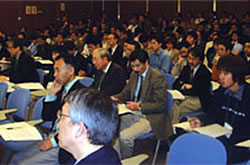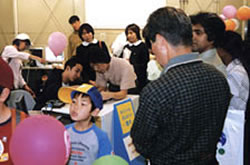A Restructuring at BSI
Seven years after its establishment, BSI has made several organizational changes to reflect its growth. First, a Unit System has replaced the Senior Scientist research program. Under this system, from Senior Scientists will become Unit Leaders (UL). Several new laboratories and Units have also been established. In the Neuronal Circuit Mechanisms Group a new laboratory and two new Units have been established: the Laboratory for Motor Learning Control (Souichi Nagao), the Hirase Research Unit (Hajime Hirase) and the Semyanov Research Unit (Alexey Semyanov UL). The Laboratory for Comparative Neurogensis (Jun Aruga) has been established in the Brain Development Research Group. The Laboratory for Symbolic Cognitive Development (Atsushi Iriki) and the Laboratory for Biolinguistics ( Kazuo Okanoya) have been added to the Cognitive Development Research Group. And, the Laboratory for Language Development (Reiko Mazuka) will join the Human Learning Research Group. In addition, the Laboratory for Developmental Gene Regulation has become the Recovery Mechanisms Research Group, and Hitoshi Okamoto has been appointed as the Group Director and, Atsushi Miyawaki has been named the Group Director of the Advanced Technology Development Group.
World Brain Awareness Week 2004

World Brain Awareness Week is a worldwide campaign that promotes the benefits of brain science. These year events at various locations throughout Japan were held from March 15 to March 21, 2004. On March 14, 2004, Koshigaya City, together with RIKEN Brain Research Institute (BSI) hosted a scientific lecture for World Brain Awareness Week at the Koshigaya Science and Technology Museum. At this meeting, Dr. Akihiko Takashima, head of Laboratory for Alzheimer's Disease, gave a special lecture on Alzheimer's disease entitled "Cutting Deep into Brain Aging with Science." A large audience, spanning all ages, including school children, attended the lecture and enthusiastically asked questions about Alzheimer's disease, demonstrating the success of the lecture.
A Joint Workshop Sponsored by "Advanced Research Science Project" and Molecular Neuropathology Group

On April 3, 2004 at the Umetaro Suzuki Hall the "Advanced Research Science Project" and BSI's Molecular Neuropathology Group co-hosted a joint workshop entitled the "Molecular pathology of Brain Diseases and the Development of Effective Treatments." Co-planner Nobuyuki Nukina, director of Molecular Neuropathology Group of BSI, will launch a research project called "Pathogenetic Research of Brain Diseases," which is part of "Integrative Research of Brain Diseases" sponsored by the Minister of Education, Culture, Sports, Science and Technology (MEXT). He expects this project to start in 2005. Professor Yasuo Ihara of the University of Tokyo, a representative from the "Advanced Brain Science Project" that started in 2000, was the workshop's other co-planner. Prof. Ihara hoped to share latest findings from treatment-oriented research concerning neuronal diseases, Dr. Nukina hoped to study the advances of research concerning these diseases.
Despite the relatively short notice, thirteen researchers agreed to speak at the workshop. Three were researchers representing BSI. 180 people registered for the workshop in advance and 165 attended, including 35 from BSI.
With a very tight schedule and limited break time, the workshop began at 9:40 and ended at 18:00. Topics from the morning lectures included: a pathogenic study of Parkinson's disease showing remarkable progress; an overview of the immunotherapeutic aspects of Alzheimer disease highlighting realistic possibilities for treatment; research on the mechanism of aggregate formation; and a report on gamma secretase-inhibitors involved in amyloid protein production. Reports on Mild Cognitive Impairment (MCI) research followed. These highlighted the current status of treatment, suggested a possible role for diagnostic imaging for MCI, and discussed ways to follow-up the effects of treatment.
The second half of the workshop focused on polyglutamine diseases (examining novel treatment options that are now possible as a result of current research) and amyotrophic lateral sclerosis (ALS) research and its pathogenesis. Work using Drosophila models to understand neurodegeneration was also presented. The final lectures introduced new findings in schizophrenia and bipolar disorder research.
In addition to lectures, the sunny setting allowed participants to enjoy lunch outdoors while looking at the cherry blossoms. Several participants commented that the workshop provided a good opportunity to hear research results from specialists in these areas and understand how the study of brain diseases fits with treatment. We hope that more workshops like this will be sponsored at BSI in the future.
RIKEN Open House

On April 17, 2004, RIKEN Wako Institute held its annual Open House in conjunction with Science and Technology Week. Blessed with clear weather, more then 5,800 guests were welcomed at the Institute, exceeding the previous year's numbers. At BSI, visitors enjoyed exhibits inviting visitors to experience the wonders of the brain from a variety of perspectives, including well-designed displays and presentations by BSI researchers. Young and old alike enjoyed these exhibits and a congenial and lively atmosphere was sustained throughout the day.





